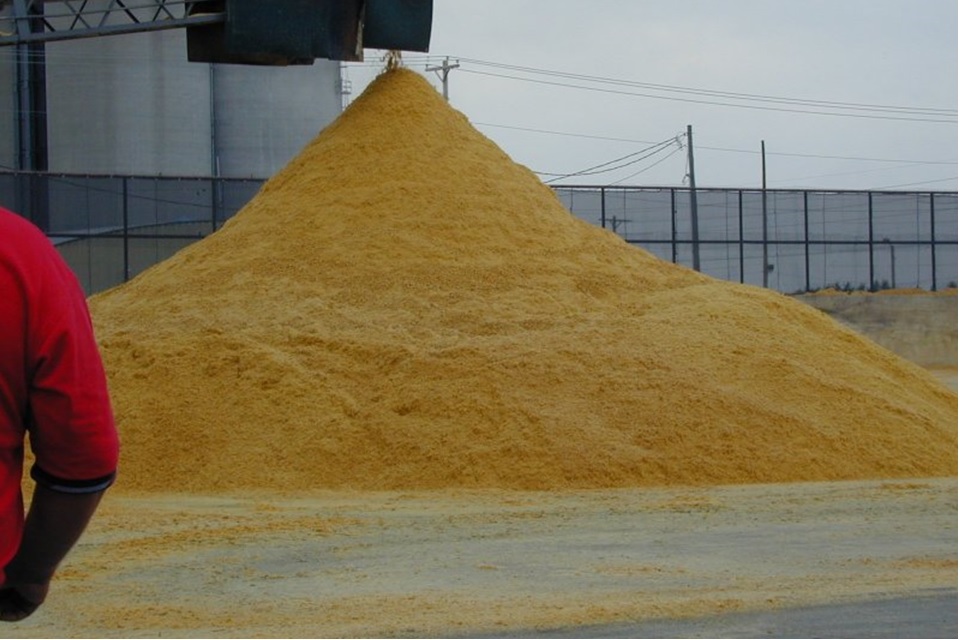
Zachary E. Carlson, Curtis J. Bittner, Dirk B. Burken, Galen E. Erickon, and Jim C. MacDonald. Summarized by Meredith Bremer, Nebraska Extension Beef Systems Educator
The composition of distillers grain fed to feedlot cattle today may differ from what has been fed in the past. This change is due to technology advancements in ethanol production and the increased value of certain ethanol byproducts such as corn oil. A change in the composition of distillers grains could affect the percent inclusion in the feedlot diet and the resulting cattle performance.
Also, an increasing interest in corn residues and the treatment of corn residues with calcium oxide due to high corn prices in recent history has led Pellet Technology USA (Gretna, NE) to develop a pellet that is comprised of distillers grain and calcium oxide treated corn stover to replace corn in finishing beef cattle diets. It has been found that pelleted corn residue and distillers grains can replace up to 20% of corn in a diet that contains 40% modified distillers grains plus solubles without hurting cattle performance
Researchers from UNL wanted to answer two questions in the following summarized study. First, they wanted to determine if replacing dry distillers grains plus solubles (DDGS) with isolated corn bran plus solubles results in similar feedlot cattle performance. They also wanted determine if replacing isolated bran from the distillers grain industry with calcium oxide treated corn stover results in similar cattle performance.
DDGS-BASED DIET vs. ISOLATED CORN BRAN AND SOLUBLES
Replacing DDGS with isolated corn bran plus soubles does not result in similar feedlot cattle performance. Final body weight (1442 vs. 1373 lbs.), dry matter intake (28.4 vs. 27.4 lbs.), and average daily gains (4.17 vs. 3.72 lbs.) were higher in steers fed DDGS compared to corn bran plus solubles. Hot carcass weights (909 vs. 865 lbs.) and 12th rib fat measurements (0.63 vs. 0.60 in.) were also greater in the DDGS fed cattle.
ISOLATED CORN BRAN PLUS SOLUBLES vs. CALCIUM OXIDE TREATED CORN STOVER
No differences in final body weights or average daily gains were reported between steers in these two treatments. However, feeding calcium oxide treated corn stover resulted in increased intakes and thus these steers were 5.9% less efficient than steers fed isolated corn bran plus solubles. No differences in hot carcass weights, longissimus muscle areas, or marbling scores existed between treatments, but steers fed treated corn stover did not have as much fat cover over the 12th rib compared to the steers fed isolated corn bran (0.54 vs. 0.60 in.).
PELLETED TREATED CORN STOVER vs. UNPELLETED TREATED CORN STOVER
No significant treatment differences existed for final body weight, average daily gain, feed efficiency, or carcass characteristics when comparing steers fed the pelleted treated corn stover treatment versus the unpelleted treated corn stover treatment. However, steers fed the pelleted treatment had a reduced dry matter intake compared to steers fed the unpelleted treatment.
SUMMARY
The results of this study (2016 Nebraska Beef Cattle Report, pg. 128-131) suggest that replacing bran isolated from the distillers grain with calcium oxide treated corn stover increases intakes and will also decreasing feed efficiency and 12th rib fat thickness. When the treated corn stover was pelleted and compared to the unpelleted form, intakes were decreased though feed efficiency and carcass characteristics were unaffected. Feeding DDGS increased final body weights, average daily gains, dry matter intakes, hot carcass weights, and 12th rib fat thickness measurements compared to corn based diets.
To listen to BeefWatch podcasts go to: https://itunes.apple.com/us/podcast/unl-beefwatch/id964198047 or paste http://feeds.feedburner.com/unlbeefwatch into your podcast app.